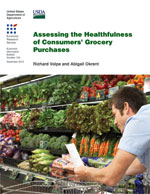Assessing the Healthfulness of Consumers' Grocery Purchases
- by Abigail Okrent
- 11/8/2012
Overview
The nutritional quality of Americans' diets has increasingly become a focus of economic research due to its effects on health outcomes. Health care and other costs associated with obesity, overweight, diabetes, and other diet-related ailments continue to swell. This study focuses on consumers' grocery (food-at-home) expenditures to measure the extent to which Americans are conforming to Dietary Guidelines for Americans with the foods they purchase at the supermarket. Overall, consumers purchase too few fruits, vegetables, and whole grains and too many refined grains, fats, and sugars/sweets. The average Healthy Eating Index score for food-at-home purchases was only 56.4 for an average consumer, far below the maximum score of 100, which would indicate full adherence to the Dietary Guidelines. The healthfulness of purchases varies somewhat across geographic regions and markets, with consumers in the Northeast and West purchasing more healthful food than consumers in the Midwest or South. Differences across income levels and across race are small,with all subgroups falling well short of the recommendations in the Dietary Guidelines.
Download
-
Entire report
Download PDF -
Report summary
Download PDF -
Download EIB102.zip
Download ZIP


